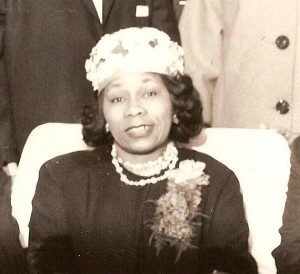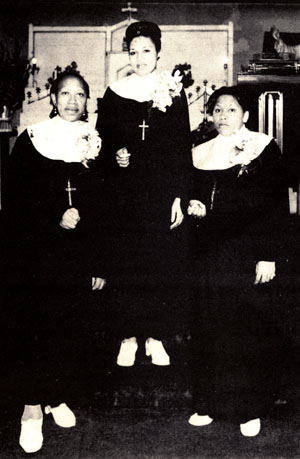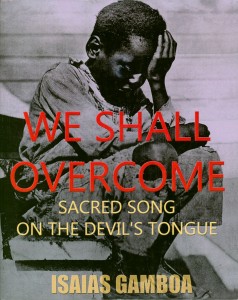About Louise Shropshire

Louise Shropshire was born Louise Jarrett on February 15, 1913 in Coffee County, Alabama to a family of sharecroppers. Her grandparents had been slaves. In 1917, her family moved to Cincinnati, Ohio where her parents were factory workers. Louise was a member of the New Prospect Baptist Church in Cincinnati and sang in the choir. She also sang with her sister, Alice Jarrett McCloud and her mother Ollie Johnson Jarrett as The Humble Three. When Louise was 16 years old, she married twenty-nine year old Robert Shropshire Sr., a bail bondsman. Robert and Louise had three children, Jackie, Robert, Jr, and Darlene.
Shropshire was a choral director and composer of religious hymns. While attending the 1935 National Convention of Gospel Choirs and Choruses in Cincinnati, she was discovered by Reverend Thomas A. Dorsey, who is considered the father of Gospel music. Dorsey asked Louise to direct the mass choir segment and for The Humble Three to perform at the convention. Reverend Dorsey and Louise continued their friendship after the convention and also revised and copyrighted Louise’s hymn,Behold the Man of Galilee together.

Shropshire went on to publish several additional gospel compositions including I Know Jesus Pilots Me, Are you Worthy to Take Communion, Come on, Jesus Will Save You Right Now, Crucified for Me, and His Precious Blood. The song, If My Jesus Wills, which she wrote sometime in the 1930s or early 1940s is argued to be the base of the Civil Rights Movement hymn, We Shall Overcome. Louise was also an African American business woman. She also opened a music store called the “You Name It Song Shop” and had her own record label, Shropshire Records.
In 1963, the Shropshires met Martin Luther King Jr. while he was on a speaking tour in Cincinnati. Reverend Fred Shuttlesworth, a family friend and a leader in the Civil Rights movement, suggested that King stay at the Shropshire home. King and the Shropshires became good friends and when King was in Cincinnati, he would stay at their home. It is believed that Shropshire played her song If My Jesus Wills for King and that he asked if he could change the words “I’ll overcome” to “We Shall Overcome” and use the song in the Civil Rights Movement. Through the success of Robert’s bail bonds business, the Shropshires were able to hold fundraisers which assisted in bailing out Civil Rights activists. Louise also helped to establish the Greater New Life Baptist Church which was founded in 1966 by Reverend Shuttlesworth.

Robert died suddenly in November of 1966 and after his death, Louise moved to California to be closer to her mother, Ollie Johnson Jarrett. In Pomona, California, Louise started a sister church to the Greater New Life Baptist Church and she also took in a number of foster children. Louise passed away on November 26, 1993. In 2012, Isaias Gamboa published, We Shall Overcome: Sacred Song on the Devil’s Tongue which vindicated Louise Shropshire as a composer of the Civil Rights anthem, We Shall Overcome. In 2013, Louise’s grandson, Robert A. Goins Shropshire, published a book of her compositions entitled, History in Song: The Legacy of Mother Louise Shropshire.
In 2014, a collection of Shropshire’s papers was donated to the University of Cincinnati’s Archives and Rare Books Library by Shropshire’s family with the assistance of Isaias Gamboa.
Read about Louise Shropshire and the Louise Shrophsire Family papers in UC Magazine and UC News.